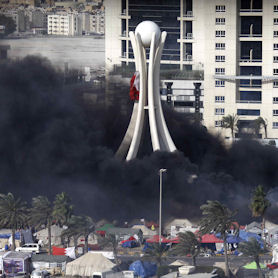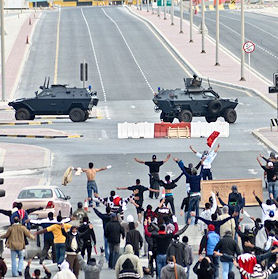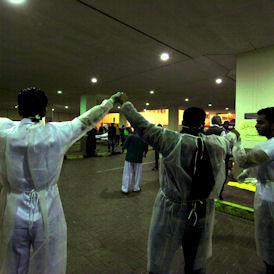Bahrain: forces ‘cleanse’ Pearl Roundabout protests
Three policeman and at least two protesters are reported to have been killed as Government troops clear demonstrators camped out at Manama’s Pearl Roundabout in Bahrain.

Hundreds of Bahraini riot police backed by tanks and helicopters arrived early on Wednesday morning to move around 500 Shia protesters who have been camped out at the roundabout near the financial district for weeks.
Protesters threw petrol bombs at the security forces who responded by firing dozens of rounds of teargas.
At least two protesters were reportedly killed and dozens more sustained injuries as the security forces moved in.
Reports also suggest three policemen were knocked down and killed by protesters as they fled in their cars from the roundabout.
Bahrain News Agency enraged protesters in the country with a news story in which it claimed security forced had ‘cleansed’ and ‘purified’ Peal Roundabout.
The report read: “Bahrain Defence Force launched an operation to cleanse the Gulf Cooperation Council Roundabout, the Bahrain Financial Harbour, the Salmaniya Medical Complex and the areas surrounding them.”
Read more in the Channel 4 News Special Report on the Arab revolt
<!–
–>

Pearl roundabout had been mostly cleared within two hours as protesters fled to other parts of the city. State television showed the roundabout, which has been the epicentre of the pro-democracy campaign, completely empty of protesters.
Abdel Jalil Khalil, the head of the Shia Muslim opposition bloc Wefaq, claimed the death toll was much higher than has been reported and that at least five protesters had been killed and many more injured.
“This is a war of annihilation. This does not happen even in wars and this is not acceptable,” he said
He also claimed troops were surrounding several hospitals, cutting off access to medical facilities for injured protesters.
Crackdown
The crackdown came a day after a state of emergency was declared and at least two people were killed in clashes in the Shia suburb of Sitra outside Manama. Seven protesters were killed last week.
An order by the king authorised the commander of Bahrain’s defence forces to “take all necessary measures to protect the safety of the country and its citizens,” a statement read out on television on Tuesday said.
That order followed the arrival of more than 1,000 Saudi-led troops with a mandate from the Gulf Cooperation Council to support King Hamad bin Isa al-Khalifa’s regime in the Sunni- ruled, Shia-majority kingdom.
The king reshuffled his cabinet on 26 February, replacing four ministers, including two royal family members. However, he did not sack Prime Minister Sheikh Khalifah ibn Salman al-Khalifah, who has held the office for more than 40 years.

Hospital blocked
Police and army forces took over the Salmaniya Medical Complex with reports emerging that injured people outside the hospital entrance were barred from entering. Ambulances were also not allowed in or out of the hospital, according to doctors there.
The doctors formed human chains at the entrance of the hospital in protest at the blockade, and said they would spread out to local health centres and mosques to help the injured there.
Bahrain’s health minister resigned over the government’s crackdown. Nezar bin Sadeq al-Baharna, a Shi’ite, stepped down but did not announce his reasons. It has also been reported that Housing Minister Majeed bin Mohsen al-Alawi was “boycotting” government and 12 judges from the Shi’ite court also resigned.
Curfew
Bahrain’s military has announced a 12-hour curfew from 4pm to 4am local time across much of the capital Manama, and banned all public gatherings and demonstrations across the country.
A statement from a military officer read: ”A curfew will be imposed from today, Wednesday 16 March 2011, until further notice. It will be imposed from 4pm to 4am, starting from the Sword Bridge until the traffic lights before the Sheikh Issa bin Salman al Khalifa Bridge, and the areas to the left of it and to the right of it to a distance of 400 metres in either direction. Bahrainis in this area should comply with security checks to allow them to move legally in this area. Secondly, marches and gatherings in the kingdom of Bahrain are banned until the country returns to normal. Thirdly, citizens and residents are to cooperate fully with security checks for their safety, and the necessary legal procedures will be taken against all those who do not cooperate,” said a military officer in a live television appearance.”
Tehran’s rhetoric darkens
Iran’s President Mahmoud Ahmadinejad said that Bahrain’s crackdown was “unjustifiable and irreparable” and urged the region to heed the mistakes made by former Iraqi dictator, Saddam Hussein, who was executed in 2006 after his regime was toppled.
“Their response to their people with rifles, machine guns and helicopters, with shells and tanks; not only is this an ugly, inhuman and unacceptable act, but also it will not have any results. It is clear that it won’t have results,” Ahmadinejad said.
He warned leaders in the region not to intervene in neighbouring countries.
“It would be good to learn from Saddam’s destiny. Why do they send military powers to a neighbouring country to confront people. Saddam’s destiny can apply to everyone. Why do some insist on repeating Saddam’s mistakes within the region?”
On Wednesday, The White House gave its clearest sign so far of its disapproval of Bahrain’s apparent use of force against protesters.
US Secretary of State Hillary Clinton said: “We find what’s happening in Bahrain alarming. We think that there is no security answer to the aspirations and demands of the demonstrators,” she said.
“We have also made that very clear to our Gulf partners who are part of the Gulf Cooperation Council, four of whose members have sent troops to support the Bahraini government. They are on the wrong track”.
Later, President Barack Obama called the kings of Saudi Arabia and Bahrain and urged them to exercise “maximum restraint” with protesters and to pursue political dialogue.”
“The president expressed his deep concern over the violence in Bahrain and stressed the need for maximum restraint,” a White House spokesman said.
Expats stream out
Bahrain Airport remains open at the time of writing and British Airways and Qatar Air are continuing to run a normal service. The Foreign and Commonwealth Office (FCO) told Channel 4 News that there are currently no plans to charter planes to Bahrain to evacuate British nationals. A spokesman said the FCO does not know how many Britons remain in Bahrain follwoing the announcement of martial law and a national curfew.
Aircraft charter company Chapman Freeborn Airchartering is experiencing a surge in demand for charter flights out of Bahrain.
Meanwhile, Banks HSBC and Standard Chartered have said they are closing all of their branch offices in Bahrain.